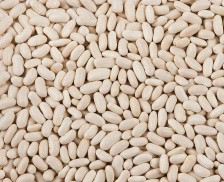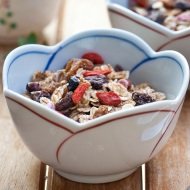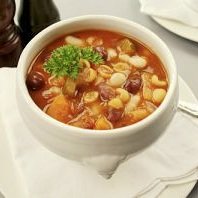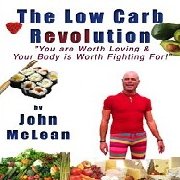Lose Weight
![]() Calories in Food
Calories in Food
![]() Calories in Vegetables
Calories in Vegetables
![]() Calories in Navy Beans
Calories in Navy Beans
Calories in Navy Beans,
Navy Beans Nutrition
How many calories in Navy Beans? See below, the Navy Beans calories for the different serving sizes. We provide you with the Navy Beans nutrition facts and the health benefits of Navy Beans to help you to lose weight and eat a healthy diet.
Nave beans are creamy white in colour and a similar size to a pea; ideal for making baked beans. Although high in carbohydrates, about 25% of their content, they are high in fiber. They also provide an excellent source of protein, calcium, vitamin B9 (folate), magnesium, phosphorus and potassium.
As they provide a great source of fiber, they are believed to help lower cholesterol and therefore reduce the risk of heart disease. Other Navy beans benefits include aiding your digestive system and giving you an energy boost from their high iron content.
Below we have three calorie tables showing the calories for this vegetable when raw, boiled or canned. We also have a detailed nutrition table. See our vegetable calories comparison chart to compare the calories in Navy beans with the calories in other vegetables.
Also, have a look how nutritious Navy Beans are in comparison to the nutrients in other vegetables.
All of our calorie and nutrition data is provided by the US Department of Agriculture.

Beans, Navy, Mature Seeds, Raw
Refuse: 0%Scientific Name: Phaseolus vulgaris
| Serving Size | Calories per Serving |
| 100 grams | 337 kcal (1411 kJ) |
| 1 cup, 208 grams | 701 kcal (2935 kJ) |
Beans, Navy, Mature Seeds, Cooked, Boiled
Refuse: 0%| Serving Size | Calories per Serving |
| 100 grams | 140 kcal (585 kJ) |
| 1 cup, 182 grams | 255 kcal (1065 kJ) |
Calories in Navy Beans, Mature Seeds, Canned
Refuse: 0%| Serving Size | Calories per Serving |
| 100 grams | 113 kcal (473 kJ) |
| 1 cup, 262 grams | 296 kcal (1239 kJ) |
Navy Beans Nutritional Information
| Nutritional value per 100 g (3.5 oz) | |
|---|---|
| Proximates: | |
| Water | 63.81 g |
| Energy | 585 kJ (140 kcal) |
| Carbohydrates | 26.05 g |
| Sugars | 0.37 g |
| Dietary fiber | 10.5 g |
| Fat | 0.62 g |
| Protein | 8.23 g |
| Minerals: | |
| Calcium, Ca | 69 mg (7 %) |
| Iron, Fe | 2.36 mg (13 %) |
| Magnesium, Mg | 53 mg (13 %) |
| Phosphorus, P | 144 mg (14 %) |
| Potassium, K | 389 mg (8 %) |
| Zinc, Zn | 1.03 mg (7 %) |
| Copper, Cu | 0.210 mg (11 %) |
| Manganese, Mn | 0.527 mg (26 %) |
| Selenium, Se | 2.9 mcg (4 %) |
| Vitamins: | |
| Thiamine (Vit. B1) | 0.237 mg (16 %) |
| Riboflavin (Vit. B2) | 0.066 mg (4 %) |
| Niacin (Vit. B3) | 0.649 mg (3 %) |
| Pantothenic acid (B5) | 0.266 mg (3%) |
| Vitamin B6 | 0.138 mg (7%) |
| Folate (Vit. B9) | 140 mcg (35 %) |
| Vitamin E | 0.01 mg (0.05 %) |
| Vitamin K | 0.6 mcg (0.8 %) |
| Percentages are relative to US Recommended Daily Intake (RDI) for adults. | |
Author: Lana Soko
You Might Also Like:
Like This Page?
|
Share This Page:
|







